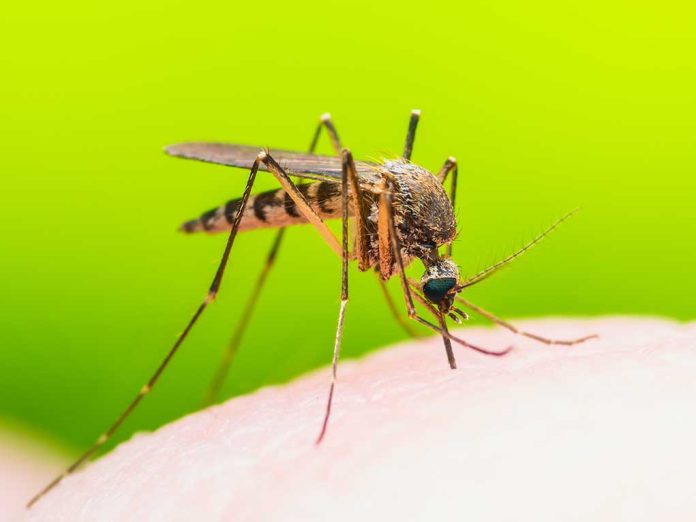
A New Hampshire man has died from a rare mosquito-borne illness, marking the first death from Eastern Equine Encephalitis (EEE) in the state in about a decade.
At a Glance
- Steven Perry, 41, of Hampstead, NH, died from EEE, a rare but severe mosquito-borne virus
- This is the first EEE death in New Hampshire since 2014
- Several NH communities are implementing mosquito control measures
- Health officials urge residents to take precautions against mosquito bites
Tragic Loss Prompts Action
The death of Steven Perry, a 41-year-old resident of Hampstead, New Hampshire, has sent shockwaves through the community and raised alarm about the dangers of mosquito-borne illnesses. Perry succumbed to Eastern Equine Encephalitis (EEE), a rare but potentially fatal virus transmitted by infected mosquitoes.
In response to this tragedy, local authorities are taking swift action to protect residents. Hampstead and neighboring towns have announced plans for widespread mosquito spraying. Chris Malerbi, a Hampstead resident, noted, “They’ve been sending out emails for the past week straight. So, they’re letting us know what they’re doing.”
A New Hampshire man who died from EEE, a rare and deadly mosquito-borne virus, has been identified as 41-year-old Steven Perry. He was the fifth person to contract the virus in 2024.https://t.co/0MDTncaA4Q
— The Daily Beast (@thedailybeast) August 28, 2024
Understanding the Threat
EEE is a rare but serious disease that affects the central nervous system. While most people infected with EEE do not develop symptoms, those who do can face severe consequences. Dr. Ruanne Barnabas explained, “It is a rare disease, but of course when it takes a life, it’s 100% for that person and their family.”
“About a third of people will die from their infections, and many more who do survive will end up with lifelong physical or mental disabilities,” according to Dr. Benjamin Chan, the state epidemiologist. “So, this is a serious infection. We want people to be aware that it’s out there and circulating.”
The last reported human EEE infections in New Hampshire occurred in 2014, resulting in three cases and two deaths. This year’s case serves as a stark reminder of the threat posed by mosquito-borne illnesses.
Preventive Measures and Community Response
In light of this tragic event, local officials are implementing comprehensive mosquito control measures. Hampstead town fields will be closed for spraying, and the Sanborn Regional School District plans to treat schools, parks, and recreation areas. Similar precautions are being taken in Kingston and Newton, where outdoor activities have been temporarily suspended.
“We believe there is an elevated risk for EEEV infections this year in New England given the positive mosquito samples identified,” Chan said in a release. “The risk will continue into the fall until there is a hard frost that kills the mosquitos. Everybody should take steps to prevent mosquito bites when they are outdoors.”
Health officials are strongly advising residents to take precautions against mosquito bites. This includes using insect repellent containing DEET or picaridin, wearing long-sleeved shirts and pants when outdoors (especially during dusk and dawn), and ensuring window screens are in good condition. Additionally, residents are urged to eliminate standing water around their homes, which can serve as mosquito breeding grounds.
Sources
- Hampstead plans to spray for mosquitoes after man dies of EEE
- New Hampshire resident dies from EEE, a rare mosquito-borne virus
- NH DHHS Identifies Person Infected with Eastern Equine Encephalitis Virus in New Hampshire

















